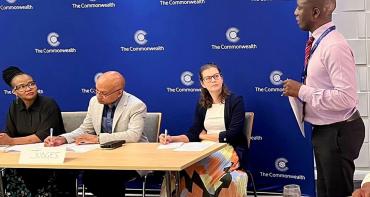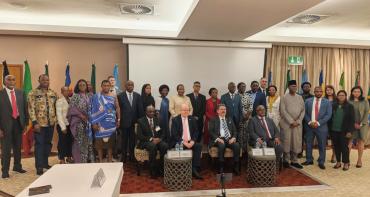The Commonwealth Observer Group commends the people of the Commonwealth of The Bahamas for the peaceful manner in which they exercised their right to vote on 3 May in the advanced polls and on the main Election Day of 10 May.

The Commonwealth Observer Group commends the people of the Commonwealth of The Bahamas for the peaceful manner in which they exercised their right to vote on 3 May in the advanced polls and on the main Election Day of 10 May.
The Group has been present in the Commonwealth of The Bahamas since 3 May. Our arrival was preceded by an advance team which has been in the country since 27 April.
We have met with the Parliamentary Registration Department, political parties, civil society, including women and youth groups, media representatives, the Police, the Public Disclosure Commission, the Public Service Commission, the Utilities Regulations and Competitions Authority.
On 3 May our team observed the advanced polls at the Kendal Isaacs Gymnasium in New Providence. On 10 May, our teams observed Election day in Grand Bahama and New Providence. Our observations include the opening of polls, actual voting procedures, the preliminary count and the official recount on 11 May. Commonwealth teams also observed the campaign events and rallies.
The following is an initial assessment of the critical aspects of the election process and the electoral environment. Our final report, which we will complete within at most, two months, will be issued at a later date.
KEY FINDINGS
The campaign
We had the privilege to observe the conclusions of the main rallies that were held after our arrival. We observed that these events and rallies were peaceful, vibrant and engaging. The fundamental rights of candidates, political parties and supporters to assemble and campaign were broadly observed.
In a robust campaign, some challenging of candidates is to be expected and its appearance did not create a sense that parties’ campaigns were being extensively disrupted. We encourage the country, and in particular, the Parliamentary Registration Department, to consider the development of a Political Parties and Candidates Code of Conduct.
The Group is of the view that it is important to ensure fair access to media when an election date is officially announced. This brings us to our observations regarding the media.
The Media
It is not uncommon for media in any election to be accused of bias. Some interlocutors noted an improvement in media coverage for this election campaign, compared to previous elections, mostly because of the vigorous online debates that obtained on social media platforms. One main complaint, though, was that the state media—the Broadcasting Corporation of The Bahamas, did not offer equal airtime to all the political parties and candidates that participated in these elections, but instead devoted a disproportionate level of coverage to the incumbent ruling party.
Notwithstanding these views that were expressed to the Group, it is our impression that the Utilities Regulations and Competitions Authority (URCA) did a commendable job in developing a Code of Practice for Content Regulation. We encourage URCA in its ongoing efforts to enable a more robust regulatory framework for public media institutions which also assures the freedoms and rights of citizens.
Similarly, a forward-thinking election management body undertakes extensive voter education, encouraging responsible use of social media, while protecting the rights of citizens to vigorously debate social and political issues online.
The Electoral Framework
The Parliamentary Registration Department is responsible for the registration of eligible voters and the conduct of elections. It currently exists and operates as a Department under the aegis of the Central Government, with specific oversight by a Cabinet Minister who has responsibilities for elections. The Parliamentary Commissioner, is a public officer, without security of tenure.
The operations of the Parliamentary Registration Department faced renewed spotlight when it was reported that the contract of the Commissioner lapsed on 4 May, five days to the elections. The Group find this occurrence highly unusual. We are of the view it unnecessarily introduced anxiety into a charged electoral environment.
An Acting Parliamentary Commissioner was subsequently appointed and most stakeholders appeared to be confident in the ability of the Commissioner to oversee a credible elections process. Our Group met with him and was similarly assured.
Voter register
Every good election starts with a reliable voter register. Despite the efforts of the Registration Department to produce a reliable manual register, it is essential that priority is given to establishing a modern and reliable voters’ register for the next elections.
Advanced polls
A Commonwealth advance team was in The Bahamas to observe the Advance Polls on 3 May. The team noted that although the actual voting inside the polling station was generally well conducted and concluded in a peaceful manner, the management of the operational and logistical aspects of the process that was of significant concern. We were alarmed by the open campaigning and loud music that prevailed in and around the advanced polling station at the Kendal Isaacs Gymnasium. When the former Prime Minister arrived to vote, the rush of the chanting crowd from supporters of the two main political parties on the barriers placed before the actual polling station was unfortunate. Such occurrences have no place in a neutral and safe voting environment. The Police must be commended for responding appropriately to manage the crowd.
Other challenges observed were the preparedness of election officials, the timely availability of a certified register to political parties and even to the returning officer in order to inform critical decisions. Further, a rather loose interpretation of the law with respect to Party Agents being allowed to vote on advanced polling day overwhelmed the system. The Group was told that pressure was brought to bear on the Parliamentary Registration Department to facilitate the processing of Party Agents as Advanced Voters even after the date stipulated under the law.
It was evident the Parliamentary Registration Department used the experience of advanced polling day to ensure some of these issues did not resurface on 10 May. We commend the Acting Parliamentary Commissioner in this regard.
The voting process and environment
We note the enthusiasm of voters to exercise their franchise, and their early arrival at polling centres. On Election Day, our observers reported that most voting stations opened on time with a few exceptions. In these instances, our team observed that voting was extended by a commensurate amount of time to ensure that all who wished to vote were able to do so in accordance with the provisions of the law.
The prescribed layout within polling stations was adhered to and was conducive for orderly voting. At the opening of polls, polling officials largely followed the opening procedures and voting generally proceeded in an atmosphere of calm and orderliness, even if slow in some instances. The process of storing and sealing ballots is in need of modernisation to ensure continued trust in the electoral process. Our full report will address these issues in detail.
We wish to highlight the following positive trends that we observed on polling day:
- A high voter turn-out
- A peaceful process
- Adequate security was provided and order was maintained at most polling stations observed, with non-intrusive presence of the police
- An inclusive process with a balance of Bahamian women and men playing their roles as voters and as polling officers.
- We further note that differently abled people as well as the elderly, mothers with young children, and pregnant women were facilitated to vote quickly.
- The secrecy of the ballot was respected.
- Polling officials generally displayed professionalism and integrity, and ensured the voting process was well organised and that voters were able to cast their votes in an orderly manner.
- Where Commonwealth Observers observed, the close and count process was largely transparent and inclusive, with candidates, candidate agents, and international observers welcomed to observe the process.
Party Agents
We commend the contribution made to the process by party agents. Party Agents we met observed the rules of the polling station, were friendly and cooperated among themselves. They frequently assisted the polling officials to find names in the register, and engaged constructively when a problem arose. If our Group could offer one comment on the role and presence of Party Agents, it is, that the Bahamian public may wish to consider whether the practice that Party Agents are dressed in party colours with some party agents wearing colours with names and pictures of candidates inside the polling station remains acceptable. In our view, this practice is at odds with international best practice where the polling station is a neutral space for the citizen to enter and exercise their franchise.
The Police
We have very strong commendations for The Police and their understanding of their role to facilitate a smooth election process for the people of The Commonwealth of The Bahamas. We were impressed with the high level of technological preparedness of the police force and the manner in which they had considered every single aspect of the electoral process that could be supported by the police. It is a model of best practice that ought to be recommended across the Commonwealth. This Observer Group intends to do just that.
Gender and Youth
The Observer Group notes and commends the increase in women candidates and encourage efforts to enhance women’s political representation in Parliament. The overwhelming representation of women working as electoral officers and party agents was obvious.
We commend the spirit of youth which we observed in the campaign and number of youth candidates. We heartily congratulate young persons who successfully contested seats in the elections. You are Commonwealth role models and we commend your active participation in Commonwealth forums and spaces.
Overall conclusion
Our overall conclusion is that the voting, closing and counting process at the polling stations on 10 May were credible and transparent. Where any petitions may emerge regarding any aspects of the elections, we call upon those aggrieved to file formal complaints as prescribed in the electoral laws, and for the relevant institutions to investigate and pronounce on these allegations.
In the experience of The Group, we note it is sometimes assumed that the foundations of our established democratic societies are so deeply ingrained that they cannot be shaken. Indeed, The Bahamas has committed itself to certain democratic values contained in the national, regional, Commonwealth and International obligations it has chosen to subscribe to. In light of the totality of our observations, The Group is of the view that the time has come for the people of the Bahamas to consider and embrace the establishment of an independent election management body with a modern voting and counting system to safeguard your admirable democratic history. We urge all stakeholders and citizens of The Bahamas to discuss and strengthen the independence of your election management body.
The Commonwealth will remain engaged with the people of the Commonwealth of The Bahamas in the journey to enhance and deepen your democracy.
It was a special honour for me and my team to be in The Bahamas at this important time and we thank the people of this beautiful country, The Commonwealth of The Bahamas, for your hospitality. We trust that our work will contribute to the continuance of democracy and good governance in the future.



